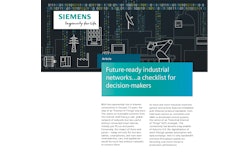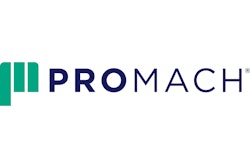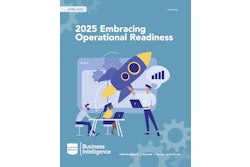“We may get money tomorrow,” said French, “and when the equipment shows up in two years, we’ll have to ask for additional funds to cover the tariff. But the desire is not to fund what you’re not exactly sure of. -Shawn French, Danone”
Tariff-driven uncertainty is reverberating across the packaged goods industry, and CPGs are feeling the impact where it hurts most: in their capital budgets. In a PMMI Town Hall titled "Navigating Tariff Changes - A CPG Perspective," a roundtable moderated by PMMI’s Jorge Izuqierdo, VP of market development, CPG leaders shared how they’re adapting equipment investment strategies in the face of shifting tariff policy, unpredictable costs, and operational risk.
Scott Spencer of Quality Harvest Foods, Shawn French of Danone North America, Greg Flickinger of American Botanicals & Aloha Medicinals, and Jon Doering of QualiTech, all brands and contract packagers who procure packaging equipment, weighed in, and the message was clear: this isn’t business as usual. From large-scale operations to mid-sized and specialty brands, tariff exposure is forcing reevaluation of what, when, and where to buy—and how to structure vendor relationships for better risk sharing.
“We’ll Do Less Work”
Shawn French, engineering director at Danone North America, laid out the challenge facing many large-scale manufacturers. “We’ll do fewer projects. We’ll do less work. It will negatively impact our spending in the U.S., which is probably not the desire of the tariff. But I think that’s the real net result. It’s not making anything better.”
Danone recently received a single tariff bill exceeding half a million dollars—one of several unexpected hits tied to importing specialized European packaging equipment. The result: growing hesitance to commit to new projects without clarity on total cost exposure. “We may get money tomorrow,” said French, “and when the equipment shows up in two years, we’ll have to ask for additional funds to cover the tariff. But the desire is not to fund what you’re not exactly sure of.”
“I’m not asking for miracles, but I want to know what’s being done to mitigate the cost—not just a surprise bill.” - Scott Spencer, Quality Harvest Foods
“We’ve Paused Everything”
Scott Spencer, CEO of Quality Harvest Foods, echoed that hesitation—albeit from a different scale. “We’ve paused everything. Paused 70% of my capital plan,” he said. “I got burned by a raw material during one of the unpauses… there was like a three-day window that I could have gotten tariffed, and I actually did.”
For smaller and mid-size CPGs, absorbing those shocks is often not feasible. “I don’t really want to take the risk of incurring charges down the road that I’m not ready for,” Spencer said. “As a relatively small manufacturer, working capital is pretty tight.”
His key takeaway? Transparency and accountability matter. “Just passing a customer invoice on to me isn’t going to earn your repeat business,” he said. “I’m not asking for miracles, but I want to know what’s being done to mitigate the cost—not just a surprise bill.”
A Tale of Two Businesses
For Greg Flickinger, who oversees both American Botanicals and Aloha Medicinals, the tariff landscape has had dual consequences. The internationally sourced botanical side was hit hard, prompting strategic cuts and reevaluation of margins. Meanwhile, his vertically integrated U.S.-based mushroom business saw a boost as customers shifted away from tariffed Chinese imports.
Still, the lessons are universal. “We don’t want to get caught like Scott did and just find the bill show up,” Flickinger said. “If these costs exist, then is there a way we can share the cost across the supply chain and make it palatable for everyone? That’s what partnership looks like.”
He also emphasized the time horizon CPGs need to consider when evaluating projects: “From capital approval to commissioning could be two years. We don’t have a crystal ball. So you have to carry higher contingencies—and that clearly impacts other projects.”
“Language in a contract that says 100% of tariffs will be passed on will probably not make the contracting period go very well.” - Jon Doering, QualiTech
A Measured Outlier
Unlike the others, Jon Doering, COO of QualiTech, said his organization is continuing with planned investments—but with strategic caution. “We are still pursuing investment,” he said, “but it’s just going to be part of the overall evaluation process.”
Doering emphasized rigorous front-end engineering design, diversified sourcing, and above all, contract clarity. “Language in a contract that says 100% of tariffs will be passed on will probably not make the contracting period go very well,” he said. “We’re making sure expectations are clear, contracts are specific, and we’re prepared for volatility.”
What CPGs Can Do Now: Contracts, Communication, Contingency
For CPG professionals navigating similar decisions, the panelists offered clear advice. First, define tariff-related terms early. “We’re working on contract language around country of origin, disclosure, and critical spares,” said Doering. “If you don’t lock that in up front, you’re likely to feel it down the line.”
“If the machine doesn’t work, the savings don’t matter. Nobody says, ‘It’s okay that line’s not running—you avoided the tariff.'" - Shawn French, Danone
Second, resist the urge to over-simplify vendor conversations. “The best business partner is somebody who wants to create win-wins,” Spencer said. “Don’t just pass through the cost—have the conversation. Show me what you’re doing to mitigate it.”
Third, think flexibly—especially when it comes to financial structure. Spencer raised the idea of rent-to-own or phased payments to help spread risk. “What can be done to allow me to commit to a project now, when there’s so much uncertainty?” he asked.
Lastly, be realistic about time and cost. “We’re buying equipment for decades of production,” French reminded. “If the machine doesn’t work, the savings don’t matter. Nobody says, ‘It’s okay that line’s not running—you avoided the tariff.’”
“We may not like it, but we’re all swimming in the same fishbowl.” - Greg Flickinger, American Botanicals
Looking Ahead
In today’s environment, the cost of delay, confusion, or misalignment can derail even the best-laid capital plans. But for those in packaging, production, and procurement roles, the takeaway is this: a solid partnership starts with transparency, shared risk, and honest expectations.
As Flickinger put it, “We may not like it, but we’re all swimming in the same fishbowl.” PW



























